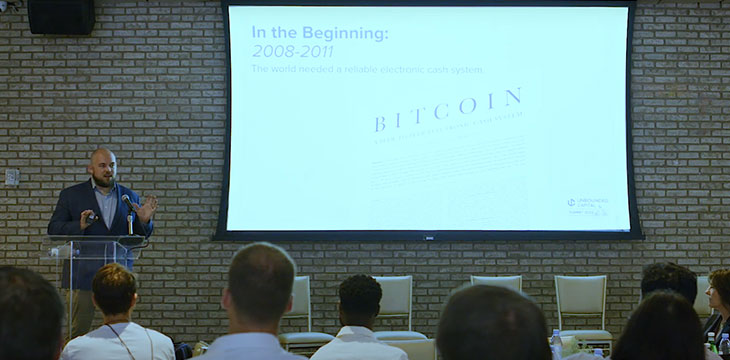|
Getting your Trinity Audio player ready...
|
At the recent Unbounded Capital Summit in New York City, Kurt Wuckert Jr. gave a keynote speech on the history of blockchain and the current landscape.
Explaining Bitcoin
Wuckert introduces himself as the chief executive officer of GorillaPool, a Bitcoin historian, and someone intent on righting the wrongs in Bitcoin.
He begins by explaining that Bitcoin could only be invented by a person with multiple interests, a polymath and a renaissance man. He describes how Satoshi Nakamoto solved the double-spending problem, demonstrating how nodes seek to reconcile the ledger using proof-of-work.
Showing the audience the first section of the white paper, Wuckert explains how Bitcoin was designed to facilitate small, casual payments. It’s payments under $5 in particular that Bitcoin was designed to solve.
Delving into Bitcoin’s history a bit, Wuckert explains how, initially, people misused it to commit crimes on the Internet. However, this is not what Bitcoin was designed for. Satoshi Nakamoto expressed displeasure with this crime culture, ultimately disappearing from the project.
Thereafter, BTC Core developers took over, fundamentally altering the original protocol. These changes made Bitcoin slow and only capable of processing medium to large-sized transactions. In the early days, Satoshi Nakamoto said that Bitcoin was capable of beating Visa, but the changes made by this team ruined that ability.
Venture Capital shows up
In 2014 or thereabouts, venture capital showed up, Wuckert tells the audience. He shows a slide detailing how Mastercard funds Digital Currency Group, Blockstream, and others. Wuckert has previously written about the Mastercard Bitcoin conspiracy and elaborates on it here.
Wuckert explains how these companies created an economy around Bitcoin being slow and a financial asset. For example, they created third-party rails, which they controlled and thus collected fees on.
“The technology to make Visa, Mastercard, and some of these other companies obsolete has existed for 14 years, and wouldn’t you know it, nobody ever told you,” he says.
They don’t want Visa and Mastercard to run on Bitcoin. They want Bitcoin to run on Visa and Mastercard. – Kurt Wuckert Jr.
Splits and scaling
Wuckert then gets into the 2017 period when BTC and Bitcoin Cash (BCH) split. He tells the audience more about Bitcoin’s original capabilities, including micropayments, smart contracts, and even non-fungible tokens (NFTs).
Wuckert explains how, in 2018, Bitcoin SV split away from BCH, intending to see just how big blocks could actually get. He explains how many naysayers said that 128MB blocks were impossible, but BSV has done it with ease.
He also illustrates how it is now set in stone and how maximum block sizes are determined by the policies of node operators themselves. Likewise, node operators can decide all other things, such as what types of scripts and tokens they will accept.
As a result, BTC can do seven transactions per second, Ethereum can do 15 transactions per second, and BSV can do 100,000 transactions per second in ideal conditions.
Wuckert briefly explains the potential of Bitcoin and what it will do in the future. This includes sending data and payments globally with stronger than military-grade encryption.
Questions and Answers
The audience at the Unbounded Capital Summit then asked Wuckert some questions in an open forum.
Q. Can you compare smart contracts on BSV and Ethereum?
Ethereum uses the solidity language and is a global state blockchain. This means it is like a personal computer but distributed across a network. The problem, he explains, is that all nodes have to cross all thresholds together, so there’s no competition among nodes. Therefore, the network can only be as fast as the worst computer on the network. This has a massive impact on fees, driving them through the roof when there’s a lot of demand.
Q. Why aren’t VCs investing heavily in BSV?
Ultimately, it’s an information gap, Wuckert explains. There’s so much funding rooted in business models based on the idea that Bitcoin is slow and doesn’t make smart contracts. Likewise, the incentives keep rewarding people who are doing nothing by making it possible to 100x your money buying and selling coins.
Q. What are the pros and cons of proof-of-work versus proof-of-stake?
Wuckert says that proof-of-stake is actually a lot like HODL. You get rich for doing nothing but holding coins. On the contrary, in proof-of-work, your node has to work to win blocks. You can’t fake proof-of-work. The way to win in proof-of-work is to be extremely competitive.
Q. What do you envision BSV’s market cap being in the future?
Wuckert says that other blockchains aren’t even competitors. He wants to disrupt money transmission, record keeping, notaries, government offices, and much more related to communications technology and money.
Watch: Unbounded Capital Summit 2022 highlights

 02-28-2026
02-28-2026 




